Kay is interviewed by On The Marc Media
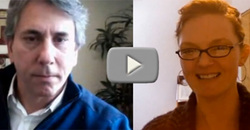 Courtesy On The Marc Media
Courtesy On The Marc Media
Jan 7, 2014
In this exclusive Google Hangout with On The Marc Media’s Marc Silverstein, author and lecturer Kay Stephens shares valuable advice about battling cyberbullying. She is leading the conversation on cyberbullying awareness and prevention in Maine. In the video (left), Stephens encourages parents to proactively set the tone of the conversation about cyber-safety with their children instead of playing cat-and-mouse with technology.
In this exclusive Google Hangout with On The Marc Media’s Marc Silverstein, author and lecturer Kay Stephens shares valuable advice about battling cyberbullying. She is leading the conversation on cyberbullying awareness and prevention in Maine. In the video (left), Stephens encourages parents to proactively set the tone of the conversation about cyber-safety with their children instead of playing cat-and-mouse with technology.
What it's like to be a Lady Geek
 Courtesy Jessica Graham
Courtesy Jessica Graham
Dec. 13, 2013
Kay talks with Emma Bauer, contributor of www.beinggeekchic.com about her new cyberbullying novel Ethel Is Hot (LOL), featuring the runty-but-adorable Ethel and what it's like to be a grown up geek.
Kay talks with Emma Bauer, contributor of www.beinggeekchic.com about her new cyberbullying novel Ethel Is Hot (LOL), featuring the runty-but-adorable Ethel and what it's like to be a grown up geek.
Is social media making us meaner?
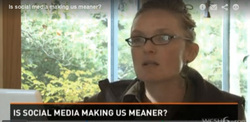 Courtesy WLBZ2.com
Courtesy WLBZ2.com
Nov. 8, 2013
WCSH6's Jackie Ward interviews Kay and others in media on the way we behave on social media. Is anonymity making us meaner online?
WCSH6's Jackie Ward interviews Kay and others in media on the way we behave on social media. Is anonymity making us meaner online?
Portland teens talk cyberbullying
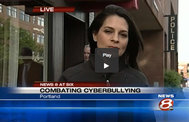 Courtesy WMTW.com
Courtesy WMTW.com
June 15, 2013
Kay is interviewed by Portland's WMTW about negative impact of bullying and ways to fight the problem.
Kay is interviewed by Portland's WMTW about negative impact of bullying and ways to fight the problem.
Kay does cyberbullying presentation for Portland teens.
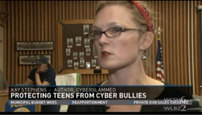
June 13, 2013
Kay is interviewed by WCSH6 after doing a presentation for Portland high school students.
Kay is interviewed by WCSH6 after doing a presentation for Portland high school students.
Cyberslammed author to speak to LGBT kids
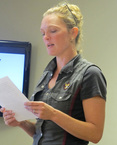
Bonnie Washuk, Staff Writer Lewiston-Auburn
October 19, 2012 LEWISTON
— Kay Stephens, one of the authors of “Cyberslammed,” will present tactics to fight cyberbullying Saturday, Oct. 20, at the University of Southern Maine's Lewiston-Auburn College.
Stephens is one of the speakers at the annual youth summit of Outright Lewiston-Auburn, a youth group for those 22 and under who are gay, bisexual or transgender.
Stephens and Vinitha Nair spent five years researching the book, drawing upon the advice of some of the most respected experts on cyberbullying.
The book coincides with Maine's first cyberbullying law enacted this past summer, which in January will require schools to adopt policies addressing bullying and cyberbullying.
The book informs parents and educators of six tactics used online, the vocabulary and when and how to intervene, Stephens said.
She began research for her book shortly after the suicide of Meagan Meier, a 16-year-old Missouri girl who killed herself over cyberbullying and a failed online romance that turned out to be a hoax. The six-year anniversary of Meier's death was Oct. 17.
One cyberbullying tactic is establishing an impostor profile, creating a fake identity to lure a target to divulge personal thoughts or information. In Meier's case, the mother of a girl Meier had a falling out with pretended she was a 16-year-old boy, “Josh,” who liked Meier.
“The woman gained her trust,” then turned on her, Stephens said. Others “in a mob mentality, all piled on telling her to kill herself.”
She added, “What's so disturbing is another girl, Amanda Todd, killed herself last week after sending her picture to what turned out to be a pedophile." Todd, 15, of Canada, was blackmailed and bullied after sexting an image of her breasts to a man who circulated it on the Internet.
“Those are the things I worry about,” Stephens said.
Other ways kids bully online include sexting, which is sending nude pictures through cellphones or computers; through websites that rate who is “hot” and who is not; “video jacking,” which is taking a photo or video and uploading it to YouTube without permission; and websites set up “to throw hate at one person,” Stephens said.
Students in grades 5 to 12 are most likely to become targets of cyberbullying, “but LGBT kids are more likely to be targets of cyberbullying,” Stephens said. Statistics show gay and lesbian youths are five times more likely to miss school because they feel unsafe after being bullied.
If they're putting out “a digital footprint,” which includes anything on Facebook, “that can potentially be used by cyberbullies to embarrass and shame them,” Stephens said.
Her book is for everyone. Her talk on Saturday will deal specifically with gay and lesbian youths.
[email protected]
October 19, 2012 LEWISTON
— Kay Stephens, one of the authors of “Cyberslammed,” will present tactics to fight cyberbullying Saturday, Oct. 20, at the University of Southern Maine's Lewiston-Auburn College.
Stephens is one of the speakers at the annual youth summit of Outright Lewiston-Auburn, a youth group for those 22 and under who are gay, bisexual or transgender.
Stephens and Vinitha Nair spent five years researching the book, drawing upon the advice of some of the most respected experts on cyberbullying.
The book coincides with Maine's first cyberbullying law enacted this past summer, which in January will require schools to adopt policies addressing bullying and cyberbullying.
The book informs parents and educators of six tactics used online, the vocabulary and when and how to intervene, Stephens said.
She began research for her book shortly after the suicide of Meagan Meier, a 16-year-old Missouri girl who killed herself over cyberbullying and a failed online romance that turned out to be a hoax. The six-year anniversary of Meier's death was Oct. 17.
One cyberbullying tactic is establishing an impostor profile, creating a fake identity to lure a target to divulge personal thoughts or information. In Meier's case, the mother of a girl Meier had a falling out with pretended she was a 16-year-old boy, “Josh,” who liked Meier.
“The woman gained her trust,” then turned on her, Stephens said. Others “in a mob mentality, all piled on telling her to kill herself.”
She added, “What's so disturbing is another girl, Amanda Todd, killed herself last week after sending her picture to what turned out to be a pedophile." Todd, 15, of Canada, was blackmailed and bullied after sexting an image of her breasts to a man who circulated it on the Internet.
“Those are the things I worry about,” Stephens said.
Other ways kids bully online include sexting, which is sending nude pictures through cellphones or computers; through websites that rate who is “hot” and who is not; “video jacking,” which is taking a photo or video and uploading it to YouTube without permission; and websites set up “to throw hate at one person,” Stephens said.
Students in grades 5 to 12 are most likely to become targets of cyberbullying, “but LGBT kids are more likely to be targets of cyberbullying,” Stephens said. Statistics show gay and lesbian youths are five times more likely to miss school because they feel unsafe after being bullied.
If they're putting out “a digital footprint,” which includes anything on Facebook, “that can potentially be used by cyberbullies to embarrass and shame them,” Stephens said.
Her book is for everyone. Her talk on Saturday will deal specifically with gay and lesbian youths.
[email protected]